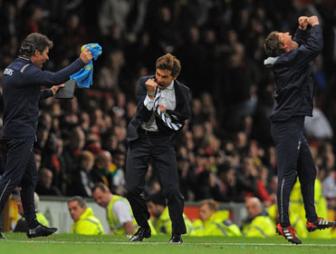 This is what getting it right looks like!
This is what getting it right looks like!Tottenham guru Windy analyses the first six league games of the AVB era...
Six league matches; three wins, two draws and one defeat. A respectable start for Tottenham Hotspur, who now sit in fifth place in the Premier League, after an excellent weekend win against Manchester United. Much has been made of Spurs' first victory at Old Trafford since 1989 - particularly the majestic first half performance - and it was interesting to note Andr Villas-Boas taking yet another different approach, tailoring his tactics towards the opposition.
In the first half, Sandro was the designated holding player, with Moussa Dembele able to break forward and Dempsey taking up a more advanced position, pressing the ball (along with Defoe). With only Shinji Kagawa linking their midfield to Robin van Persie, United struggled to get beyond Sandro and instead were forced to play the ball wide, where Giggs and Nani were isolated and under-par.
In contrast, Spurs were finding much joy; the energy of Clint Dempsey and Dembele, and the pace of Aaron Lennon and Gareth Bale were causing an ageing United midfield problems, but it was the directness of left-back Jan Vertonghen that led to the first goal. Buoyed by the confidence that the goal gave them, Spurs continued to knit passing moves together in deep midfield, before driving forward - Bale's devastating run (with Defoe's intelligent movement dragging Evans away) created a second goal, and United were a defensive shambles.
Sir Alex Ferguson did everything right at half-time; he took off Giggs - a passenger in the opening 45 - and replaced him with Wayne Rooney. Kagawa moved to the left, but frequently cut inside, meaning that United now had more players buzzing between the lines, and Spurs were forced to adjust. Dembele played much deeper, and even Dempsey, Bale and Lennon dropped back, leaving Defoe isolated and struggling to hold the ball up on the rare occasions that Spurs got out of their half.
After the previous match, a 2-1 home win against QPR, the Spurs coach explained that his intention was to allow the away side possession, before catching them on the break. This was not the worst idea against a team with Granero and Faurlin in midfield - two superb passers who are not defensively mobile. No fans enjoy watching their team play on the counter at home against "lesser" opposition, though, and it wasn't until AVB changed to a more pro-active attacking style that Spurs came into the game.
The game-plan seemed spot on against West Brom, where Spurs started quickly and got the ball forward with ease, but failed to capitalise. Nerves set in, and Spurs dropped deeper, eventually conceding an equaliser.
One tactical point to note - at 1-0 and with 15 minutes to go, Villas-Boas replaced Defoe with Jenas, with the intention of closing out the game. This would not necessarily be notable in isolation, but he then did the same against Norwich the following week, this time replacing Defoe with Tom Huddlestone. Despite the end result being dropped points in both instances, this pragmatic approach is something I expect to see more of as AVB gets to know his squad.
Комментариев нет:
Отправить комментарий